The Value of Summer Assignments
I recently read a post on Medium from a teacher, David Knuffke, whom I have never met but have come to respect the opinions of in most topics concerning science education.
How I Killed My Summer Assignment (And Why It Had To Die)
For those too busy/lazy/whatever to read what he has to say, I’ll summarize it, hopefully without harming the integrity of his message: His AP Biology summer assignment had become an unnecessary hoop for his students to jump through, and he didn’t feel like giving his students an assessment which wasn’t benefiting them personally or as students. I agree with this idea, by the way. There are few things related to education that I detest more than unnecessary assessments. I cringe whenever I hear someone talk about how they give a school/district/state assessment where the data is kept in a file, just in case the data is ever needed to justify some decision after-the-fact. [Shudder]
But I also think that summer assignments can be important. I will not make some outlandish claim that my students are inadequate, underprivileged, or otherwise unprepared for the rigor of AP classes in general, or even AP Biology specifically. What they tend to be, though, are “memorizers”; they like to be told the “best” way to do something, exactly what they need to “know for the test”, and then they will give you all of that information (often verbatim from the source).
It is actually quite impressive, and may even be helpful… when I took AP Biology in 2003. “Kids these days” seem to be suffering from the standardized testing that dominated their elementary and middle school education. The creativity and problem solving needed to be successful at the next level has been drill-and-killed out of them. Regardless of the students’ college and/or career plans, those are skills which are found in the best and brightest of any field. This is all just a long-winded way of saying that I use my summer assignment to get students the practice they need building specific skill sets which will make their time in AP Biology a much smoother process.
Assignment Introduction PDF: IsingAPBio_2014SummerAssn
So what do I do? Each summer I pick a creative nonfiction book (something from the “Science” section of a bookstore/library) that all my students will read. I do my best to make sure that there is an affordable paperback version available on Amazon (or a similar online retailer) or that it can be checked out at the local public library, as I don’t want my students to be unnecessarily burdened. I also try to make the book as interesting as possible because I am subversively trying to get them to enjoy reading about science and start building a library of their own. From there, they have three basic tasks for their assignment:
- Tweet-ups during the summer to talk about themes from one third of the book
- Products to make for each chapter in an “active journal”
- In-class discussion on the book during our first full day of class
If you want more information about the importance of modeling appropriate social media use, I can point you to some great resources, but I like using Tweet-ups to “meet” my students and let them talk informally about the book with their classmates in a slightly more realistic conversation than you can have on a message board. I like this, too, because I have a relationship with most of these kids the day that class starts, which allows us to get down to business more or less from day one. On the “cons” side of the list, there are some parents that don’t allow their students to have a social media account, but after I share a Storify of one of our past chats, most allow their youngling to participate.
My favorite part of the assignment, though, has to be the products. They are, basically, a series of art projects to complete for each chapter that they wouldn’t normally associate with a science class. I received a number of concerned emails from new students about whether collage, poetry, painting, and story-telling were all products that needed to be done, or if they could “opt-out” by writing an essay (which I, of course, denied). I am always amazed by what students can do when given the freedom to express themselves in their learning process. And the self-described “non-artsy” students are usually surprised at what they can produce.
The following gallery is an example of last year’s assignment over the book The Universe Within by Neil Shubin. I chose this book because we were starting the year with biochemistry and biological structures, and Dr. Shubin does an above-average job (in my opinion) of explaining how complex biological systems could have arisen from something as remote and distant as the Big Bang, and of providing interesting anecdotes of the people and discoveries that helped us reach our current understandings. The student that completed the assignment in the gallery, Morgan Johannesen, has also written her own critique of the summer assignment which you can read here on KABT.org.
- Cover
- Introduction
- Chapter 1: Origin Story
- Chapter 2: Sketchnote 1
- Chapter 3: Poetry
- Chapter 4: Collage
- Chapter 5: Painting
- Chapter 6: Explain it!
- Chapter 7: Musicology
- Chapter 8: Radiolab Podcast
- Chapter 9: Sketchnote 2
- Chapter 10: Freestyle
- Vocab and Discussion ?s
- Summary
Really, summer assignments should be fun. Students should expand their boundaries and try things that they wouldn’t normally. And they should be able to experiment and grow as a student without fear of sabotaging their grade, especially before they even step into a classroom.
But as LeVar Burton used to say, don’t take my word for it… 😉
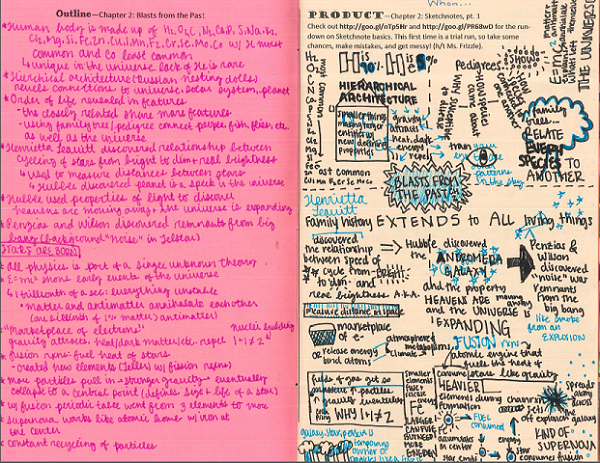
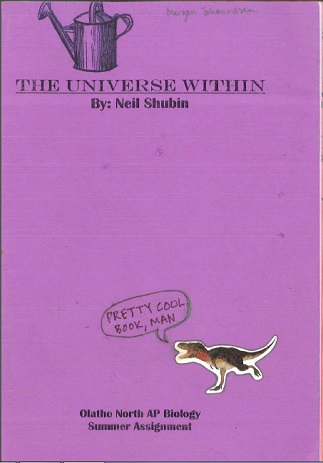
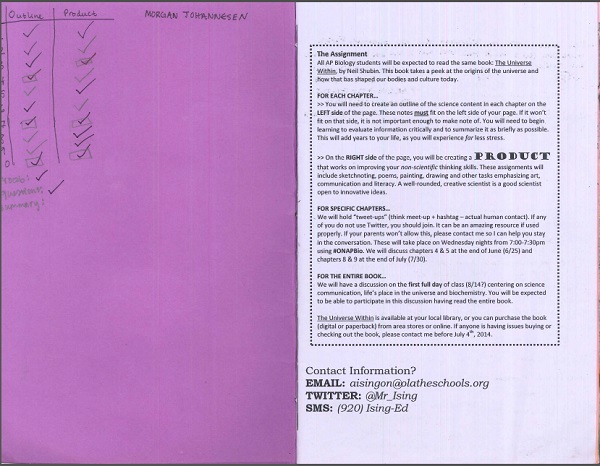

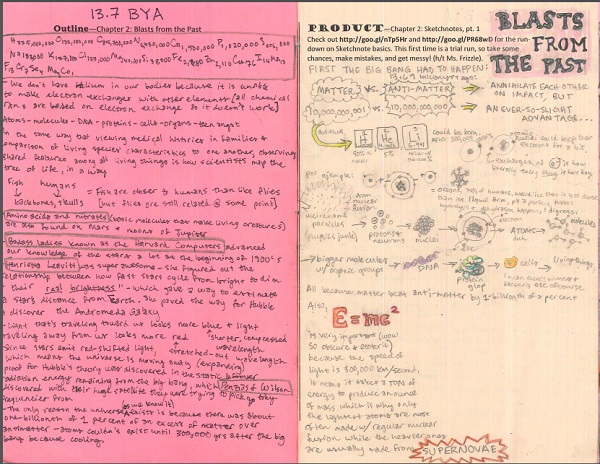

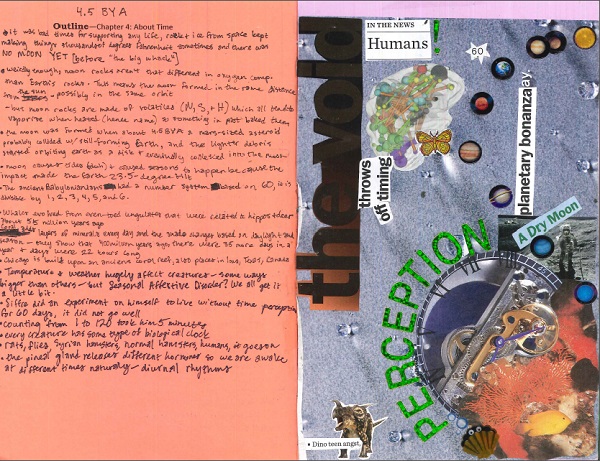
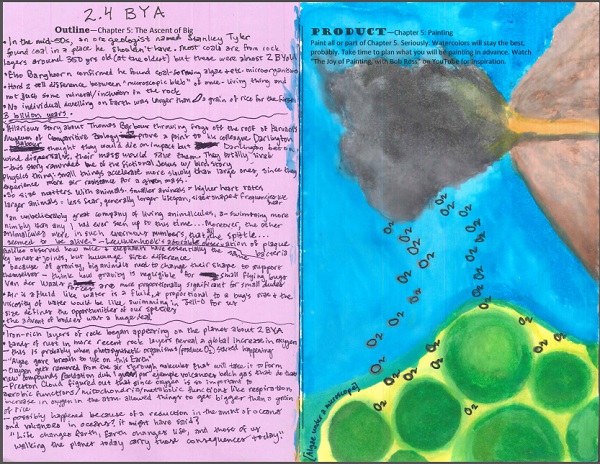


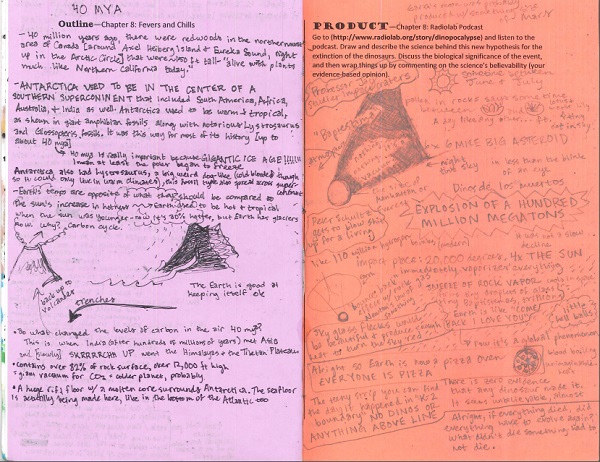

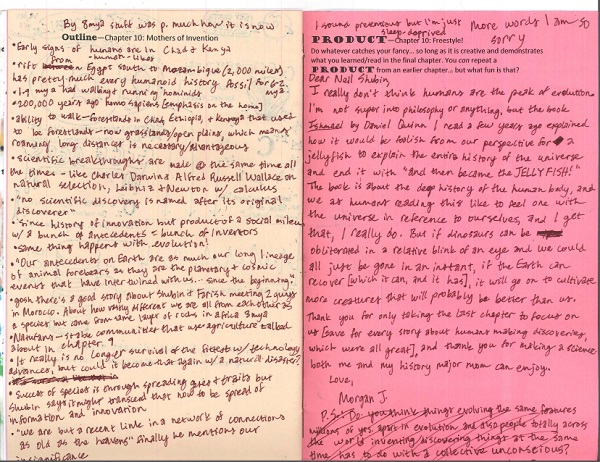

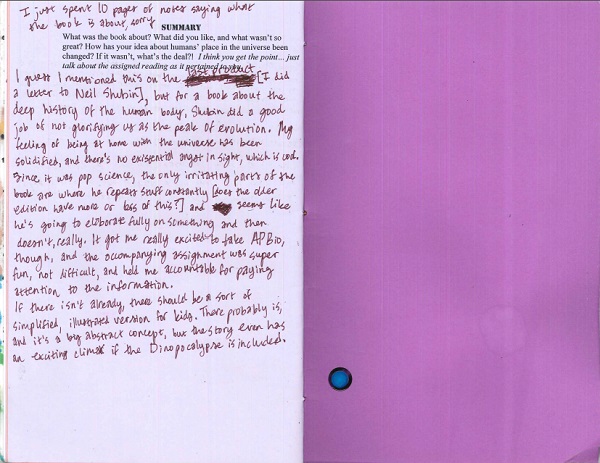
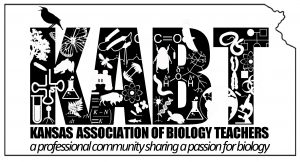
Great stuff here. Thanks for writing up your model and sharing it with all of us.
Personally, I have no truck with any summer assignment that is working for you, or your students. Anything that gets folks to reexamine the “givens” in their classrooms is a win as far as I’m concerned.
Thanks for checking it out, David. I sometimes worry that I change to much what I do in class from year-to-year… it drives my wife crazy when I am revamping/redoing a lab late at night that I spent hours on the year before. #TeacherProbs